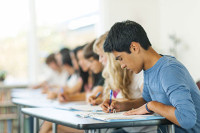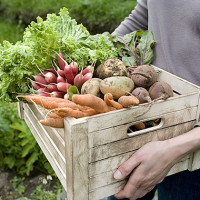Today is the 40th anniversary of Earth Day, started by Senator Gaylord Nelson, who back in the 1960s wanted a forum for environmental concerns about the land, waters, and air of the earth. Planned as a “teach-in,” support for Earth Day 1970 spread in excess of expectations as a grassroots response across the nation. “American Heritage Magazine” called it “…one of the most remarkable happenings in the history of democracy…”
These many years later, core issues include advocacy, climate change, conservation and biodiversity, education, energy, green economy, green schools, recycling and waste reduction, sustainable development, water, and food and agriculture. See earthday.org for more information.
In Sonoma County, the 350 Garden Project is challenging residents to create a food garden, volunteer to garden, or be a sponsor through their program to create 350 waterwise gardens in one weekend, May 15-16. These gardens can be as small as an apartment patio, include city landscapes, schools, churches, and businesses, or be built by a neighborhood.
This project is part of the “Grow Healthy Food” initiative launched earlier this year for the purpose of engaging residents as food gardeners to increase the consumption of fresh and healthy foods.
The goal is a garden is every neighborhood. See igrowsonoma.com for additional information and to register your garden to become one of the 350 gardens installed on May 15-16.
To that end, in the Valley, Nuestra Voz, a nonprofit organization providing leadership development for the Latino community in Boyes Hot Springs, will be distributing wine barrels, plants, and soil to 60 households at Spring Village and are working to develop a garden at Larson Park.
In Sonoma, Rebecca Glatt of The Sonoma Ecology Center (SEC) is leading the effort. On Saturday, April 24, there will be a spring plant sale with veggie starts, native and drought tolerant plants, and ornamentals. Stop by from 9 a.m. to 5 p.m. at Sonoma Garden Park. Contact Glatt at 996.0712 ext. 108 for information. 19990 Seventh Street East, 815.4871, sonomaecologycenter.org.
Also at the Garden Park, from 10 a.m. to noon that day there will also be an Introduction to Beekeeping workshop brought to you again by the SEC. Will Ackley, who currently manages several active hives at Sonoma Garden Park, will discuss the benefits of keeping bees in a garden and how to harvest their surplus honey. He will give an overview of how a bee colony operates, the importance of bee pollination to agriculture, the equipment needed to keep bees, and the duties of the beekeeper. A honey tasting will conclude the seminar. The workshop is $20 for Sonoma Ecology Center members and $25 for non-members.
Enjoy Earth Day 2010 by taking a walk, planting something, or just enjoying the beauty of the earth in this special Valley.
Special Earth Day celebrations on Thursday, April 22:
Benziger Family Winery will be donating 100 percent of net profits plus $1 for every bottle sold on line to La Luz Vineyard Worker Services. Tasting room open from 10 a.m. to 5 p.m.
Whole Foods Market is having a reading circle with author and founder Steve Viglione and Dr. Marilyn Powers of the book, “I Am the Earth” followed by an earth’s creatures cookie decorating today from 10 a.m. to noon. 201 W. Napa St., 938.8500. For more information, see iamfoundation.org.
Gundlach Bundschu is having a complimentary Earth Day vineyard tour starting a 1:30 p.m. ending is a seated wine tasting in the Barrel Cave dining room. Reservations at 938.5277
Other Green News
Green initiatives at Benziger Family Winery
Benziger has launched an “eco-friendly” pacakagin initiative that includes lighter bottles and new labels. The new bottles wiehg 30 percent less than a traditional wine bottle, which amounts to 289,600 pounds of glass saved per year, as well as the resources required to ship that weight. The new labeling not only reflects a new look for the Benziger Family Winery line of wines, but uses 30 percent post consumer waste and soy-based, eco-friendly ink.
Bike to Work Day
On Thursday May 13, 2010, tens of thousands of residents from all corners of the Bay Area will put their car keys aside, grab their helmets, and hop on their bicycles and ride to work.
Bike to Work Day is being promoted locally by the Sonoma County Bicycle Coalition and there will be Energizer Stations throughout the county.
The first Energizer Station will be set up in the parking lot at the entrance to MacArthur Place and Saddles Restaurant from 6 to 9 a.m. They will be offering a complimentary continental breakfast for riders to enjoy on their way to work.
A second Sonoma Valley Energizer Station at the entrance to the Bike Path on Highway 12 at Lomita Avenue across from Maxwell Park will also be serving from 6 to 9 am. For more information on Bike to Work Day and the Sonoma County Bicycle Coalition visit www.BikeSonoma.org/Bike2Work.html
The Bird Rescue Center
The Bird Rescue Center is looking for volunteers and is offering orientations during April and May, 2010. Learn of the opportunities available year around or during their busy Baby Bird Season (April through August). Orientations are held at 3430 Chanate Road, Santa Rosa. For more information, visit the web site at www.birdrescuecenter.org. Or call 523-BIRD to register for one of the dates listed below.
Junior (12-17) orientation dates
(Parent/Guardian must attend session with the junior)
Saturday, April 24 11:00 a.m. – 1:00 pm
Saturday, May 15 2:00 – 4:00 pm
Adult orientation dates
Friday, April 23 7:00 – 9:00 pm
Sunday, May 16 2:00 – 4:00 pm
Forty tips for the fortieth anniversary of Earth Day.
Recyle something that you normally don’t. Batteries, CDs and old cell phones, and more. Get the specifics at Earth911.com.
Use online resources like Freecycle and Craigslist. Get rid of stuff you are no longer need or acquire things secondhand. Beats sending things to landfills or buying new things you may not need.
Don’t rinse. Save time and money by skipping rinsing your plates before putting them into the dishwasher.
Hang wash outside to dry. Nothing like laundry dried in the fresh air.
Buy a cute reusable mug, cup or bottle from which to enjoy your hot or cold beverage.
Turn off computers at night. Don’t just put them to sleep, saving an average of 4 cents a day or $14.60 a year.
Use matches instead of lighters. Lighters end up in land fills. Cardboard matches are made from recycled materials.
Don’t get a paper phone book. Use an online directory instead.
Do errands in bulk. Fit in as many errands as possible on one trip.
Inflate your tires. Fully inflated tires means your car will go further on less gas.
Wrap presents creatively. Newspapers, maps, contact paper make great package covers.
Buy green power from your utility. In many states, you can opt to purchase renewable energy from your local power company for a few extra dollars a month. Visit eere.energy.gov/greenpower to get started.
Curtail junk mail. If everyone in the United States reduced the junk mail they receive every week, 100 million trees would be spared each year. Go to optoutprescreen.com to stop receiving pre-approved credit card offers and sign up on catalogchoice.com to reduce the amount of unsolicited catalogs.
Change printing practices. Soy-based ink and printing on both sides of the paper can make a big difference. Also, simply switching printer fonts can use less ink – Century Gothic is a good choice.
Wash your laundry in cold water. When you do laundry, make sure to do full loads (saving 3,400 gallons of water a year) in cold water. Or, use a spritz or two of vodka to freshen up clothes in between laundry loads. Vodka kills odor-causing bacteria, but doesn’t leave a scent when dry.
Free the lint bunnies. The average U.S. household spends up to $135 a year in energy costs drying clothes. A dirty lint filter can use 30 percent more energy to get the job done.
Turn off the tap. Water consumes almost one-fifth of California’s electricity use and the average faucet releases about three gallons of water a minute; so take shorter showers, turn off the water when brushing your teeth or shaving and use water-efficient landscaping.
Ditch the bottled water. Use a water-filter pitcher instead. Bottled water isn’t necessarily cleaner or better for you than tap water. Get a Brita water-filter pitcher or an in-sink faucet filter. Take advantage of what you already pay for and save the environmental cost of transporting bottled water to the grocer’s shelf.
Install a better showerhead. If you have a wrench, you can preserve the diminishing fresh-water supply and reduce expensive water-heating costs. Install faucet aerators and high-efficiency showerheads and in a year’s time you’ll save between 1,000 and 8,000 gallons of water. Bonus: The added air makes the pressure feel greater, too.
Buy an eco friendly yoga mat. Yoga studios around the country are embracing the idea of mat recycling and donation. Recycle Your Mat has mail-in programs for all types of mats.
Go with organic workout attire. Organic cotton uses agricultural methods designed to help sustain the land it grows on and the people who harvest it, helping to reduce the toxic pesticides used to make conventional cotton.
Exercise outside. Soak in the vitamin D benefit of sunshine and save on the energy used to run the treadmill.
Use concentrated laundry detergent to reduce packaging waste.
Skip red meat once a week. Meat production, especially in mass-produced beef, is extremely resource-intensive. Eat less of it and choose pasture-fed, sustainably-raised beef whenever you can. If you alone gave it up once every seven days, you would save the 840 gallons of fresh water it takes to produce a single serving.
Clean up your dishwasher. Switch to a dishwashing powder that’s biodegradable and plant-based. These cleansers cut through grime, but they do it without the bleach and phosphates that threaten river and marine life and leave chemical residue on your dishes.
Buy a package of recycled napkins. If every American household purchased one package of 100 percent recycled napkins, we would save one million trees. Consider buying recycled paper towels and tissues, too.
Choose biodegradable cat litter. Most cat litter is made from bentonite clay, which is mined and never breaks down. Americans dump 2 million tons of this into landfills every year, so it’s worth rethinking what you buy.
Reuse everything. Change your mind-set and think twice before throwing anything out. Resealable plastic bags that held carrots today can hold crayons tomorrow. Coffee-cup cardboard sleeves from this morning’s brew can be tucked in a purse pocket to be used again later in the day.
Change your driving. Pick one day a week to walk, bike, use public transportation, or carpool when commuting to the office or running errands. When driving, make sure to follow the speed limit. Exceeding the speed limit by 5 mph on the freeway results in an average increased fuel bill of six percent.
Unplug unused electronics. Electronic appliances use electricity even when turned off, and by eliminating these electricity vampires you can save 6 to 26 percent on your average monthly electricity bill.
Change your lights. Replacing incandescent light bulbs with fluorescent lights can save $30 or more in electricity costs over the bulb’s lifetime.
Maintain your thermostat. This summer, set your thermostat to 78 degrees to save 5 to 20 percent on cooling costs.
Visit the library. Check out books from your local library instead of buying new ones.
Down five free eco friendly iPhone apps just in time for Earth Day: iRecycle, Treehugger, Coupon Sherpa, Carbon Calc and iLocavore.
Rethink the pooper scooper. If you use plastic grocery bags, recycle them for doggie poop bags or for small trashcan liners.
Clean up your cleaners. Consider organic cleaning products like vinegar, borax, and baking soda.
Don’t use the toilet as a trash can. Don’t throw tissues, cottonballs or anything else that doesn’t belong into the toilet.
Take a hike. Take along a trash bag and help pick up litter.
Drink wisely. After a busy day of saving the environment, treat yourself to a large bottle of wine. The larger the glass bottle, the less wasteful.
Recycle this newspaper.






